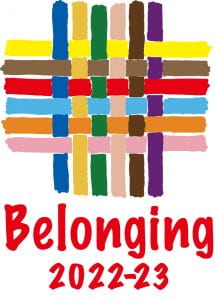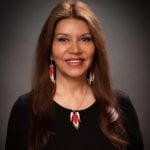2022–23 Belonging

The Oregon Humanities Center announces its 2022–23 endowed lecture series centered on the theme of “Belonging.”
A universal human need is to belong—to have cohesive bonds and connections with people and places. Addressing the topic of belonging necessarily requires expanding our understanding of what is belonging, exclusion and barriers to belonging, created and contested spaces of belonging, and how ideas of belonging reinforce historical patterns. Our historical social framework is built on a scaffold that pre-determines who belongs, and who has value and power. These systems continue to produce unjust and inequitable outcomes for people and the planet.
This year’s lecture series looks to explore the theme of Belonging through the topics of climate destabilization, disability justice, Indigenous sovereignty, immigration, and racial justice. Our speakers will apply their diverse perspectives, experiences, research, knowledge, and ideas to foster conversations about what it means to belong, who decides who belongs, and how to create more inclusive systems for everyone.
 Charlotte Coté is a professor in the Department of American Indian Studies at the University of Washington. She is from the Nuu-chah-nulth community of Tseshaht on the west coast of Vancouver Island. Coté has dedicated her personal and academic life to creating awareness around Indigenous health and wellness issues and in working with Indigenous peoples and communities in revitalizing their traditional foodways. Her current book, A Drum in one Hand, A Sockeye in the Other: Stories of Indigenous Food Sovereignty from the Northwest Coast (UW Press, 2022) examines how cultural foods play a major role in physical, emotional, spiritual, and dietary wellness. She is also the author of the book, Spirits of Our Whaling Ancestors. Revitalizing Makah and Nuu-chah-nulth Traditions (UW Press, 2010) as well as numerous articles. Coté serves as series editor for the UW Press’ Indigenous Confluences Series. She is the founder and chair of UW’s annual “Living Breath of wǝɫǝbʔaltxʷ” Indigenous Foods Symposium. wǝɫǝbʔaltxʷ is a Luhshootseed word meaning Intellectual House.
Charlotte Coté is a professor in the Department of American Indian Studies at the University of Washington. She is from the Nuu-chah-nulth community of Tseshaht on the west coast of Vancouver Island. Coté has dedicated her personal and academic life to creating awareness around Indigenous health and wellness issues and in working with Indigenous peoples and communities in revitalizing their traditional foodways. Her current book, A Drum in one Hand, A Sockeye in the Other: Stories of Indigenous Food Sovereignty from the Northwest Coast (UW Press, 2022) examines how cultural foods play a major role in physical, emotional, spiritual, and dietary wellness. She is also the author of the book, Spirits of Our Whaling Ancestors. Revitalizing Makah and Nuu-chah-nulth Traditions (UW Press, 2010) as well as numerous articles. Coté serves as series editor for the UW Press’ Indigenous Confluences Series. She is the founder and chair of UW’s annual “Living Breath of wǝɫǝbʔaltxʷ” Indigenous Foods Symposium. wǝɫǝbʔaltxʷ is a Luhshootseed word meaning Intellectual House.
 Cartoonist Keith Knight takes a deep dive on 20 artists who inspired him to use his art to address social issues. Folks like Ollie Harrington, Langston Hughes, Octavia Butler, Oscar Michaux, James Baldwin, alongside current artists like Dread Scott, Public Enemy, and Fly.
Cartoonist Keith Knight takes a deep dive on 20 artists who inspired him to use his art to address social issues. Folks like Ollie Harrington, Langston Hughes, Octavia Butler, Oscar Michaux, James Baldwin, alongside current artists like Dread Scott, Public Enemy, and Fly.
“How to Cope with Climate Anxiety: Saving the Earth and Saving Ourselves”
Wednesday, March 8, 2023
Watch the lecture recording
Watch Britt’s UO Today interview
Britt Wray’s fascinating and hopeful talk demonstrates the emotional and existential effects of living in a warming world—and how we can get through them together. Although anxieties surrounding the climate crisis can cause us to burn out, give up, and question deeply personal decisions like whether to have children, working through these anxieties can unlock a deep capacity to care for and act on climate issues. We need to look at the climate crisis as a whole—not just the political or technological issues, but the mental health consequences as well. These effects can be severe, even leading people affected by climate events to experience PTSD and a loss of identity. To combat this, Britt presents practical tips and strategies for healthily and productively dealing with our emotions, living with climate trauma, and strengthening our communities so we can combat climate change together.
 Britt Wray is a Human and Planetary Health Postdoctoral Fellow at the Stanford Center for Innovation in Global Health, Stanford Woods Institute for the Environment and London School of Hygiene & Tropical Medicine Centre on Climate Change and Planetary Health. Her research focuses on the mental health impacts of the ecological crisis. Wray is the creator of the weekly newsletter about “staying sane in the climate crisis” Gen Dread (gendread.substack.com) and author of Generation Dread: Finding Purpose in an Age of Climate Crisis (Knopf, 2022). Her first book is Rise of the Necrofauna: The Science, Ethics and Risks of De-Extinction (Greystone Books, 2017). She has hosted several podcasts, radio and TV programs with the BBC and CBC, and is a TED speaker.
Britt Wray is a Human and Planetary Health Postdoctoral Fellow at the Stanford Center for Innovation in Global Health, Stanford Woods Institute for the Environment and London School of Hygiene & Tropical Medicine Centre on Climate Change and Planetary Health. Her research focuses on the mental health impacts of the ecological crisis. Wray is the creator of the weekly newsletter about “staying sane in the climate crisis” Gen Dread (gendread.substack.com) and author of Generation Dread: Finding Purpose in an Age of Climate Crisis (Knopf, 2022). Her first book is Rise of the Necrofauna: The Science, Ethics and Risks of De-Extinction (Greystone Books, 2017). She has hosted several podcasts, radio and TV programs with the BBC and CBC, and is a TED speaker.
Cressman Lecture
“A Place in the Narrative: Telling Underdocumented Stories”
Tuesday, April 18, 2023
Watch the lecture recording
Watch her UO Today interview
 Natalia Molina is a professor of American Studies and Ethnicity, University of Southern California. Her research explores the intertwined histories of race, place, gender, culture, and citizenship. She is the author of How Race Is Made in America: Immigration, Citizenship, and the Historical Power of Racial Scripts (UC Press, 2014) and Fit to Be Citizens?: Public Health and Race in Los Angeles, 1879–1940 (UC Press, 2006). Her most recent book is A Place at the Nayarit: How a Mexican Restaurant Nourished a Community (UC Press, 2022), on immigrant workers as placemakers—including her grandmother—who nurtured and fed the community through the restaurants they established, which served as urban anchors. She co-edited Relational Formations of Race: Theory, Method and Practice, and is now at work on The Silent Hands that Shaped the Huntington: A History of Its Mexican Workers. In addition to publishing widely in scholarly journals, she has also written for the L.A. Times, Washington Post, San Diego Union-Tribune, and more. Molina was a 2020 MacArthur Fellow.
Natalia Molina is a professor of American Studies and Ethnicity, University of Southern California. Her research explores the intertwined histories of race, place, gender, culture, and citizenship. She is the author of How Race Is Made in America: Immigration, Citizenship, and the Historical Power of Racial Scripts (UC Press, 2014) and Fit to Be Citizens?: Public Health and Race in Los Angeles, 1879–1940 (UC Press, 2006). Her most recent book is A Place at the Nayarit: How a Mexican Restaurant Nourished a Community (UC Press, 2022), on immigrant workers as placemakers—including her grandmother—who nurtured and fed the community through the restaurants they established, which served as urban anchors. She co-edited Relational Formations of Race: Theory, Method and Practice, and is now at work on The Silent Hands that Shaped the Huntington: A History of Its Mexican Workers. In addition to publishing widely in scholarly journals, she has also written for the L.A. Times, Washington Post, San Diego Union-Tribune, and more. Molina was a 2020 MacArthur Fellow.
“Down for the Cause: Grace, Space, and Belonging in Social Movements”
Tuesday, May 16, 2023
 Britney Wilson is an associate professor of Law and Director of The Civil Rights and Disability Justice Clinic at New York Law School. Prior to NYLS, Wilson was a staff attorney at the National Center for Law and Economic Justice, a Bertha Justice Fellow at the Center for Constitutional Rights, and a Marvin M. Karpatkin Fellow in the Racial Justice Program at the American Civil Liberties Union. Born with Cerebral Palsy, Wilson has written and spoken extensively about disability and the intersection of race and disability for various media outlets, including The Nation, Longreads, and This American Life.
Britney Wilson is an associate professor of Law and Director of The Civil Rights and Disability Justice Clinic at New York Law School. Prior to NYLS, Wilson was a staff attorney at the National Center for Law and Economic Justice, a Bertha Justice Fellow at the Center for Constitutional Rights, and a Marvin M. Karpatkin Fellow in the Racial Justice Program at the American Civil Liberties Union. Born with Cerebral Palsy, Wilson has written and spoken extensively about disability and the intersection of race and disability for various media outlets, including The Nation, Longreads, and This American Life.